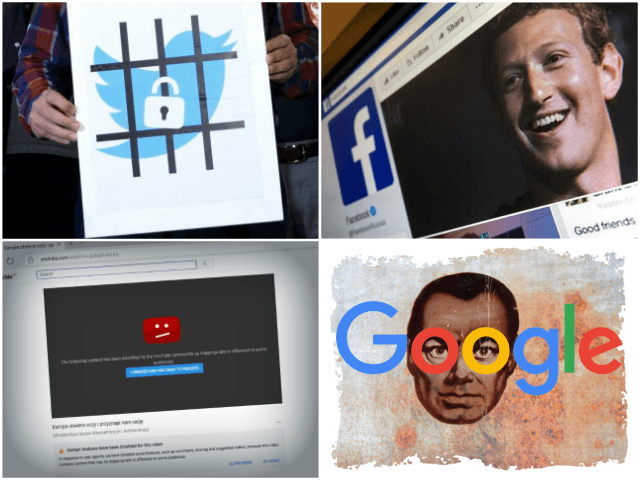Federal Communications Commission (FCC) Chairman Ajit Pai wrote in a blog post on Tuesday that we need to think “seriously” about whether social media giants need to abide by “new transparency” requirements regarding censorship and privacy.
Chairman Pai published a wide-ranging blog post on Medium Tuesday that discussed social media giants’ role in privacy and censorship ahead of Twitter chief executive Jack Dorsey’s hearing before the House Energy and Commerce Committee’s hearing on Wednesday.
Pai noted that the New York Times hired Sarah Jeong in August as its newest editor and subsequently raised controversy after the public discovered her numerous anti-white tweets.
In one tweet in 2014, Jeong likened “dumbass fucking white people” sharing their opinions to “dogs pissing on fire hydrants.”
To illustrate Twitter’s bias, Turning Point USA Communications Director Candace Owens mimicked the wording of Jeong’s tweets – but she substituted the words “Jewish people” for “white people.” Twitter subsequently suspended Owens.
Pai noted that Twitter rescinded the suspension after the public backlash, in which the social media giant said it was an “error.”
Pai asked rhetorically, “But how was the suspension decision made? Was it by an algorithm or a human? How was the reversal decision made?”
The FCC chairman pointed out the discrepancy between Internet service providers (ISPs) and content providers such as Google, Facebook, and Twitter, where ISPs have “strict transparency requirements” on their blocking and throttling practices, yet there remains little transparency in the social media giants’ content moderation practices.
Pai wrote:
Should these companies be more transparent about their business practices? Currently, the FCC imposes strict transparency requirements on companies that operate broadband networks — how they manage their networks, performance characteristics, and the like. Yet consumers have virtually no insight into similar business practices by tech giants. Do steps need to be taken to ensure that consumers receive more information about how these companies operate, and if so, what should those steps be and who should take them?
Pai recalled last year when he said in a speech that Google, Facebook, and Twitter have become the Internet “gatekeepers” that decide what content we see.
“These providers routinely block or discriminate against content they don’t like,” Pai added.
The FCC executive recently noted that Google’s YouTube “demonetized” PragerU, restricted Rep. Marsh Blackburn’s (R-TN) Twitter campaign ad for “inflammatory” content, and Facebook blocked a campaign ad for Elizabeth Heng.
Pai suggested that he does not want to call for “strict, utility-style” regulation of content providers such as Google, Facebook, and Twitter. However, Pai noted, given these companies’ increasingly dominant status in society, “The public deserves to know more about how these companies operate.” Pai also said that the country needs to discuss whether these companies, like ISPs, should face increased transparency requirements regarding their privacy and censorship practices.
Chairman Pai explained:
And we need to seriously think about whether the time has come for these companies to abide by new transparency obligations. After all, just as is the case with respect to broadband providers, consumers need accurate information in order to make educated choices about whether and how to use these tech giants’ platforms.
Silicon Valley social media giants have faced increasing scrutiny from tech experts, lawmakers, and even President Donald Trump.
Sen. Orrin Hatch (R-UT), a former Senate Judiciary chairman, sent a letter to the Federal Trade Commission (FTC) last week to investigate Google’s anti-competitive practices.
President Donald Trump recently took to Twitter to chastise Google and criticize its search engine as “rigged” for favoring liberal and establishment news publications in its search results. Trump also said that Google’s biased search results “will be addressed.”
Google search results for “Trump News” shows only the viewing/reporting of Fake News Media. In other words, they have it RIGGED, for me & others, so that almost all stories & news is BAD. Fake CNN is prominent. Republican/Conservative & Fair Media is shut out. Illegal? 96% of….
— Donald J. Trump (@realDonaldTrump) August 28, 2018
Former FCC Wireless Bureau Chief Fred Campbell told Breitbart News in an interview in August that Congress should repeal Section 230 of the Communications Decency Act, which allows the social media giants to censorship without significant legal recourse.
“They’re subject to a legislative exception that is a couple decades old, overturning a century of law. If they want to play editor, great, then comply with the laws that all of the others editors comply with and give up your special exemption,” he added.
Pai concluded, “It’s time to have a full and open conversation about the realities of today’s Internet economy.”

COMMENTS
Please let us know if you're having issues with commenting.